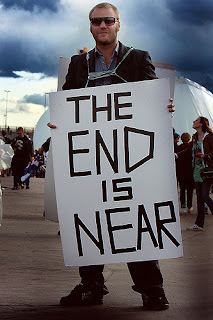Many have used the Bible to predict the year "the end" will come. A large group of Christians believed the end would certainly come in the year 1260. More recently, Edgar Whisenant wrote a popular booklet, "88 Reasons Why the Rapture will be in 1988," which is still available for purchase on Amazon. Even when a specific year is not given, many people have heard claims that the end certainly can't be more than 40 or 50 years away. Of course, people have been saying that for hundreds of years. The consequence is that the Bible comes across as a confusing book that no one can possibly interpret correctly.
The problem is not with the Bible, but a system of interpretation that the Bible itself does not support. The problem begins with the assumption that the Bible is just too complicated for "ordinary" people to understand. Compounding this problem is the assumption that there must be lots of symbolic values and hidden meanings that point to fantastic information. Someone who wants a captive audience can then claim to have deciphered these hidden meanings and share exciting new revelations. Granted, some parts of the Bible are hard to understand. But the Bible tells us when numbers or messages are symbolic and mysterious. For most of the Bible the key to interpretation is to assume that the Bible is understandable. The difficulty is to overcome our own biases and read what the text says in context.
Matthew 24 reports Jesus' teachings on "the end." The chapter is a goldmine for strange and "creative" interpretations. For example, in 24:7 Jesus says, "Nation will rise against nation." Different groups have claimed, "Ahh, in World War I we saw an unprecedented level of nations rising against nations, that must be a sign that the end is approaching." In reality, wars have broken out frequently since the time Jesus made this statement. Every century or two wars have gotten bigger and more deadly because of steady improvements in military technology, transportation (the world is "getting smaller") and the earth's rising population. There is nothing about World War I that breaks historic trends. Neither is there any evidence that Jesus had a "world war" in view at all. (By the way, the "Seven Years War" of the 18th Century was arguably more "global" than World War I, which was mostly fought in Europe.) Jesus even specifically stated that war is "the beginning of birth pains" (24:8). In other words, Jesus identifies wars as events that will continue until the end and have nothing to do with a specific sign of the end drawing near.
Similarly, Jesus reports that "Earthquakes" are not the sign of the end. But the fact that he mentions earthquakes has started countless discussions about the end every time a major earthquake is reported. In actuality, there is zero evidence that earthquakes are any more common today than they were in any previous century. Check out the NOAA database on earthquakes to see for yourself. Any perception that earthquakes have increased is caused by wishful thinking, larger populations (people live in more places), and better reporting (we wouldn't hear about earthquakes as much prior to advanced communication systems).
In Matthew 24:34 Jesus makes the most important statement in the chapter, "I tell you the truth, this generation will certainly not pass away until all these things have happened." This leads to one of three conclusions.
1. Jesus was wrong. The end did not come during the lifetime of the disciples. I believe there is no good reason to think this is the best interpretation.
2. "This generation" refers to a future generation that will begin in the future. Usually this is connected with World War I or the return of the Jewish state in 1948 (Jesus must return within a generation - 40 years of 1948, hence 1988). The trouble is that there is no clue in the text to interpret the generation as a future one.
3. Jesus is saying that all the things that must take place before the end is near will take place in the lifetime of the disciples. This is my view. In other words, pay careful attention to what "these things" are in Jesus' statement. If you consider the context of the opening question in 24:3 and Jesus' statement in 24:33, "when you see all these things, you know that it is near, right at the door," it is clear Jesus is not talking about the end itself, but the events that he discusses that must take place before the end, the last of which is the destruction of the Jewish temple, which occurred in AD 70 (within 40 years). Everything Jesus predicted in Matthew 24 took place by that time - including wars and earthquakes, except for his actual return. So, from the year 70 on, the end has been "near." I take "near" to mean that the end could come quickly because very little has to happen for it to take place. Other teachings of Jesus in Matthew indicate there will be a long delay in terms of time, but not in terms of events (see Matthew 25).
How long will the delay be? Jesus even says in Matthew 24:36, "No one knows about that day or hour, not even the angels in heaven, nor the Son, but only the Father."
I do believe we are living in exciting times. We are closer today to Jesus' return than ever before. In particular, some of the events in Israel today may indicate that we are indeed very close. But we have to be careful not to overstate the case that the end is near or interpret specific Bible passages out of their context in order to fit our own agenda.
